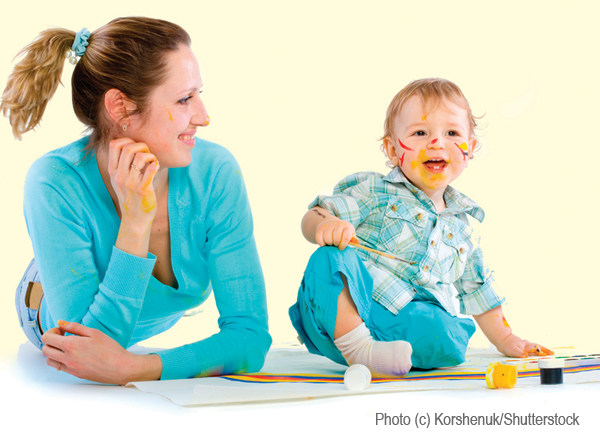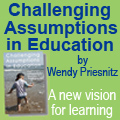Baby Play
By Sara Norman-Politinsky

Playing with our babies and toddlers can be fun, but they don`t always need, or benefit from, our full-time entertainment. In fact, our constant attention in this way can lead to unnecessary dependency and thwart self-reliance and even creativity.
As psychologist and free-range play advocate Peter Gray wrote a while back in this magazine, it’s not our job to keep our children busy and entertained and can even interfere with the benefits they would otherwise reap from free play. However, many of us react to the way we were parented and believe that our children need our constant attention while they play. That, I believe, is the genesis of the helicopter parenting that we read so much about, when parents worry about every aspect of their children’s well-being and hover over them even into adulthood. It also can exhaust parents and make us feel trapped.
Child care expert Janet Lansbury says that parents should not even coax their children to play, “because coaxing signals to kids that we’re uncomfortable, tends to increase their resistance to whatever we want them to do, and can even turn an activity as innately pleasurable as play into a chore.”
So what is the alternative? Lansbury points out that we can safely leave a young child – even a baby – in a one hundred percent safe, familiar play space with age-appropriate toys and objects. And they will occupy and enjoy themselves – even learn on their own – no matter how young. A safe space and a few familiar objects are often all it takes for infants to spend time on their own.
Just try it! Leave your child alone for a while with paper, crayons, blocks, and other favorite toys. See what happens? Even a young baby, left lying on her back, can play by herself, examining her fingers and toes, and observing the space around her. She will probably happily occupy herself for much longer than you could have imagined. You can peek occasionally or often, based on your comfort level…and stay in the same room so she’s safe and feels safe.
If that doesn’t work because you’ve already accustomed your little one to your brand of entertainment, you might have to wean him off your attention a bit at a time in order for him to regain an interest in child-led play and be comfortable with exploring the world on his own terms.
I am not advocating that you abandon your child in front of the television. Nor is this attempt to foster self-direction contrary to attachment parenting. It is, instead, about having respect for your child’s abilities and assisting her to develop a sense of herself and her boundaries. There are lots of times where you can be close to and interact with her – feeding, changing her diaper, carrying her in a sling as you go about your day, etc. But finding a balance between closeness and allowing her to play on her own is in your and your child’s best interest.
Copyright © Life Media
Privacy Policy
 



|

